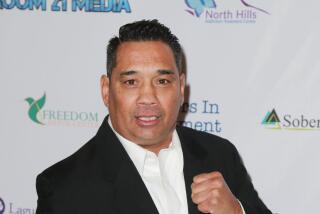Fight Doctor Censured for Altering Data
- Share via
It has been a slugfest more brutal than any 10-rounder you will see on a Friday night: the state’s boxing commission against a respected Beverly Hills physician who once served as the agency’s top ringside doctor.
And the official scorecard shows that the doctor, Robert M. Karns, 63, has taken the brunt of it during his long-running contest with the California Athletic Commission.
As one result of that feud, state medical officials have announced that Karns--a national authority on fighter safety and a medical advisor to the World Boxing Council--has been slapped with three years’ probation on his medical license for altering mandatory hepatitis blood tests before two 1997 bouts.
The probation began in April but was not announced until July.
“Dr. Karns falsified important medical records,” said Deputy Atty. Gen. Adrian K. Panton, who handled the matter for the Medical Board of California.
“What it boils down to here is [Dr. Karns] was trying to do some boxers a favor.”
State officials say that the mandatory hepatitis tests, as well as those for HIV, are necessary to guarantee boxers’ safety in a sport where blood can flow freely. Athletic commissioners were so disturbed about Karns’ actions that they barred him from serving as a ringside physician in California.
Karns contends that he is being unfairly singled out.
Although he admitted in a settlement with the medical board that he altered boxers’ records “for the purposes of deception,” Karns has maintained to investigators and in a recent interview that he did so with the knowledge of a top boxing official. And in the interview, he said, “It was doctored, but I wasn’t trying to fool anyone.”
The boxing official, Michael Wells, the commission’s former executive director, denies knowing about the altered test results.
Karns sued the Athletic Commission for defamation and civil rights violations, but the case was dismissed.
“I was framed,” said Karns, who served as the commission’s chief medical advisor from 1991 to 1998. “Why the hell would I risk my reputation for a couple of fights that could be easily delayed a couple of weeks?”
Karns said he is guilty of nothing more than what other doctors do every day: changing medical records. The Athletic Commission declined to comment on the Karns case. Robert Lynch, its top official, said the agency considers it closed.
“This is the most outrageous prosecution by the state I’ve seen,” said Steven J. Brady, a San Rafael attorney who represented Karns. “Dr. Karns devoted nearly 20 years to boxing in California. He loves the sport.”
One of the athletic commissioners who weighed Karns’ fate believes the doctor was railroaded and became a “victim of a power struggle” within the agency.
“Under the name of expediency, Bob bent a rule,” said Andrew Kim, an athletic commissioner from 1992 through July. “I don’t think he violated the law.”
State records show that Karns has run afoul of medical authorities before. At the time of the blood test incident, he was on a year’s probation for admitting that he wrote excessive prescriptions for the painkiller Percodan without justification or a medical examination for a Hollywood personality, records show.
Karns said he wrote the prescriptions for an entertainer who was in Europe, and that he did not know two other doctors were writing prescriptions for the personality as well. That probation expired in October 1997, records show.
But it has been the boxing-related charges that have landed a hard blow to Karns, whose office wall includes a montage of him at ringside with the likes of Mexican boxing legend Julio Cesar Chavez.
He still rubs shoulders with boxing’s elite. Karns said that he recently attended the wedding of former world super-welterweight champion Terry Norris and that he is the personal physician for Laila Ali--Muhammad Ali’s daughter, who is also a boxer.
It was with Karns’ support that the Legislature passed a 1996 law requiring that boxers’ blood be tested for HIV and hepatitis B.
Irregularities Noted in Tests
The law took effect in mid-1997, and shortly afterward it came back to haunt Karns when he served as the ringside doctor for a Sept. 29, 1997, series of fights at the Great Western Forum.
The account of what happened that night, as well as the state’s subsequent investigation, is detailed in the official allegations and settlement published by the medical board, as well as in documents filed in Karns’ own lawsuit.
According to those documents, questions arose about hepatitis tests that Karns submitted for two fighters--one a lightweight from Ghana, the other a local fighter.
Three months later, in December 1997, Athletic Commission officials say, they noticed irregularities in the tests while shuffling through paperwork. The box listing test results had been whited out and the word “negative” was typed in using a font different from the rest of the report, documents show.
That prompted Wells, then the commission’s executive director, to ask for a probe by the state Department of Consumer Affairs, the parent agency of the Athletic Commission and the medical board.
Karns told investigators that he telephoned the laboratory to get a verbal report on the blood tests because they were marked “pending” when the paperwork was made available, just hours before the September 1997 fight.
Karns said that someone at the lab told him the results were negative, and that he then told his own employee to replace the word “pending” with the word “negative” in the results box, records show. Karns said he hand-delivered the paperwork to the Forum before the bouts, documents show.
In the recent interview, Karns said that he informed Wells before the fight that he had made the change and that Wells reluctantly accepted the tests.
Wells says otherwise. Although he became suspicious when he saw the different type fonts right before the fights, it was not until the investigation was underway, months later, that he learned the paperwork had been altered, Wells added.
Karns “never acknowledged to me changing it,” said Wells, who has since gone to another state office.
Laboratory employees also denied giving Karns the results over the phone, adding that the blood tests were not complete until Sept. 30--the day after the bout, according to medical board accusations.
The actual results are not disclosed in the documents, but both fighters have been licensed to box since--something athletic officials say would happen only if their blood tests were negative.
As the investigation was winding down, boxing commissioners landed a jab by barring Karns from ringside duties, beginning in April 1998.
Seven months later, Karns landed his own punch by filing a Los Angeles Superior Court civil lawsuit, alleging that the agency had violated his civil rights and defamed him.
That suit, however, was dismissed in August by the judge, who ruled that the Athletic Commission’s conduct was eminently reasonable.
Karns thought that ended the matter. But the medical board continued to pursue the case and in April approved a settlement putting him on three years’ probation. The deal also obligated Karns to provide 10 hours of free medical treatment a month for the next two years, and pay the costs of the investigation.
Karns said that when word of what happened in California reached others in the boxing world, he received several new opportunities--including the advisor position with the WBC.
“Speak to anyone--boxer, manager or promoter--and they’ll tell you I am sorely missed,” he said. “I was doing half the shows in California. I really could not do it again.”
More to Read
Go beyond the scoreboard
Get the latest on L.A.'s teams in the daily Sports Report newsletter.
You may occasionally receive promotional content from the Los Angeles Times.











